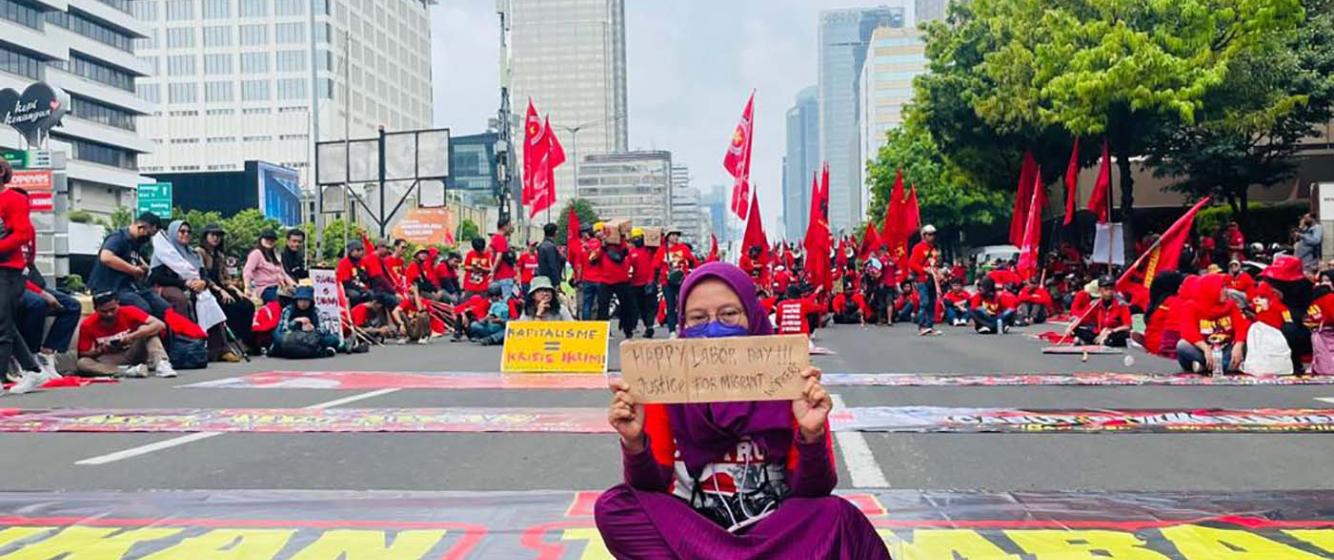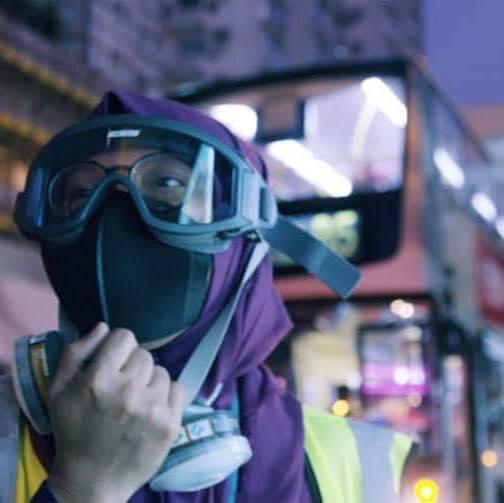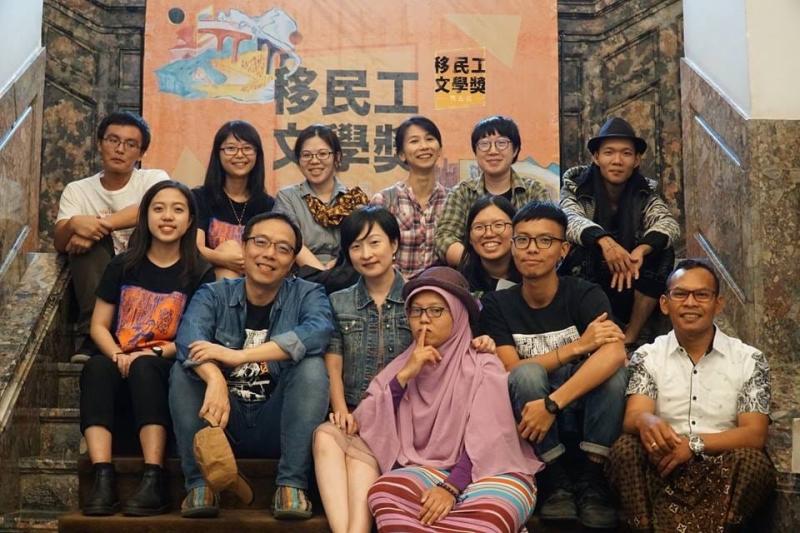
Gasmask, camera and detention: I saw injustice at home, in the market, on the street
Yuli Riswati was an Indonesian domestic worker and a citizen journalist detained and deported by the Hong Kong government in 2019 due to her reporting on the Anti-Extradition Movement. Her writing about her experiences in the detention, 1672, won the 2020 Migrant Worker Literature Award in Taiwan. The following narrative was constructed by Isabelle Cockel, based on an interview that she conducted with Yuli Riswati in Indonesia.
In 2018, I won the Migrant Literature Award for the first time. All the winners were invited to go to Taiwan to collect the award. When the awardees received their award, they told the audience what their motivation was. When it was my turn, I said I was a big fan of F4 and I wanted to see where the Meteor Garden was filmed – there’s no chance for me to meet the actors, so I may as well try to see the place where everything happened!

Photo courtesy of Yuli Riswati
Fig. 2: Yuli Riswati and her gas mask.
But my motivation for writing 1672 and submitting it to the 2020 Literature Award was very different. My friend and I created Migran Pos in March 2019, and we posted news about the 2019 demonstrations in Hong Kong. But there was so much hate speech attacking me. They said things like: ‘You’re just a domestic worker, you’re not a politician, you’re not an academic, you’re not a professional, why do you want to write about politics?’; ‘It’s not your job! It’s not your business! You’re just a domestic worker!’; ‘We domestic workers shouldn’t do such things! You did too much!’ Some people even posted, ‘Don’t come back to Indonesia!’ The community of domestic workers didn’t support me; I’ve lost a lot of friends. I didn’t want people to misunderstand me so I wrote about my detention experiences as 1672, the identification number assigned to me by the detention centre.
I was a domestic worker for 12 years; I understand them. Talking about politics – whichever politics that is – is a taboo for Indonesian citizens. But they didn’t understand the importance of freedom of speech. The prices of food had gone up so much after the protests, but they didn’t understand that what happened in Hong Kong also affected them.

Photo courtesy of Brilliant Time Bookstore
Fig. 3: Yuli Riswati received her Literature Award in 2018.
In fact, at the beginning, my writing on Migran Pos wasn’t about Hong Kong politics. In 2019, there was a presidential election in Indonesia, and Indonesian citizens for the first time could cast their votes abroad. There was a lot of posting about the election on social media, but Indonesian domestic workers in Hong Kong couldn’t distinguish fake news from information or opinion. So, my motivation was like, ‘whichever presidential candidate you support, I need to tell the community of Indonesian domestic workers in Hong Kong what’s going on.’ Actually, on Migran Pos, I also wrote about everyday things, such traffic jams, important dates on the Islamic calendar, or why MTR routes are shown in different colours. As a matter of fact, it was because I was writing about traffic jams that I became curious about the protest, because nobody told us what’s happening on the street. The Hong Kong government told the people ‘don’t dare go to the street!’ and the Indonesian Consulate told domestic workers ‘it’s dangerous, don’t go there!’ Their tone was treating us like children. Even a child would ask his/her parents: why can’t I go? We domestic workers in Hong Kong are not young. We have the right to know what’s happening. If we knew what’s going on, we could decide what we wanted to do.
So, my motivation was not to talk about politics but just to collect and provide information for my community so that we could make informed decisions about where to go and what to do. Some domestic workers thanked me for doing that because they were affected by the protest – because our employers’ family was also affected by the protest. Old people in Hong Kong supported the government, but their children supported the protesters, and I found myself working for one such family. The grandmother I looked after was very worried. Sometimes she cried; other times she was very angry. She said she didn’t understand what young people were doing. Her son and daughter told me if their mother got too upset, I shouldn’t talk about the protest, and I shan’t let her watch TV. Instead, I should start taking her out to the park. You see, politics was not far away on the street – it was right in our living room! When the family of our employer was rowing amongst themselves, we domestic workers were in the middle. That was very stressful, and I could only tell the grandmother ‘calm down, relax, don’t worry.’
Politics was also in the market. During the 2014 Umbrella Movement, a friend of mine went to the market and bought some umbrellas. The shop owner took it out at her: ‘Why are you buying many umbrellas? Are you supporting the protestors?! Is your employer supporting the protestors?!’ My friend didn’t know how to reply. I told the man that we in Indonesia didn’t get good umbrellas and she bought these umbrellas for her family and friends back home. When the protestors occupied the street, their everyday life was also unfolding on the street: young people were catching up with their schoolwork, artists were painting the scene, and a street library was set up with books displayed in cardboard boxes.
During the 2019 Anti-Extradition Movement, there was tear gas everywhere, but gas masks were so expensive that I couldn’t afford one. My friend asked me whether we should report from the street. She speaks English but not Cantonese. I told her the police were attacking protestors with tear gas, so it was too dangerous for us to go. People who read about my reports on Migran Pos bought us gas masks and told us to put them on. Whilst putting it on, I was thinking about those protestors in Taiwan, Thailand, Vietnam and the Philippines. Why did they also go to the street? Why would the powerful people do such things to their own people, and why didn’t they listen to these people? On the street, in front of me, these young people, like my son or my brother, were just hit by the Hong Kong riot police. Who were these police? Were they bad people, or were they just taking the order from their commanders because that was their duty and they weren’t free to make their own decisions? The government said the protestors were terrorists, but who was really terrorising people? I was angry but confused; I felt sad but also scared. I was crying about the justice lost to those tear gas attacks, which felt like the price we must pay if we make or demand on the street.
I went to other protests, too, but these were the protest organised by the Indonesian Migrant Worker Union (IMWU). Although I’m in Indonesia now, I continue to communicate with Indonesian domestic workers in Hong Kong via WhatsApp and Migran Pos on Facebook. After the 2019 protest, it’s become so much more difficult to carry on our advocacy work in Hong Kong. My colleagues in Hong Kong have to be much more careful now. IMWU and ATKI (Asosiasi Buruh Migran Indonesia Hong Kong) could not work together with local unions and academics at universities anymore, because political situations in Hong Kong have deteriorated. In 2019, when I was on the street, I thought this might happen; now, in 2023, it has indeed happened.
With primary school education, I went to Hong Kong in 2007 when I was 25. Like everyone else, I wanted to earn a higher wage and save for my 4-year-old son so he could go to university. I wanted to give him a better life. I thought I’d only work there for two to four years. Before going to Hong Kong, I lived my whole life as an orphan brought up by my granny in a village in Java. I’d never been to a big city, not even to Jakarta. Going to Hong Kong was like landing on a different planet. Everything was so strange – I couldn’t speak Cantonese or English, I didn’t understand Hong Kong culture, and I had no friends or a phone. My first employer hired me only for a week, then sent me back to my agency because they didn’t like me. My agency told me to go to Shenzhen and wait for my second employer. I didn’t understand why, but I did as told.
My second employer treated me well. She knew that I couldn’t understand them, so she encouraged me learn to speak Cantonese by watching TV or listening to the radio. To learn to speak English, she took me to a shop where I bought an electronic Indonesian-English dictionary. This is how I learned to speak and read in English. I’m an introverted person and couldn’t make friends easily, so I went to the library. I checked out books from there and read them at home.
But my employer also underpaid me for two years. She said she’s not well off and couldn’t give me a full wage. She knew this was illegal, so she didn’t want to hire me anymore because she thought I had become too smart and I might sue her for my underpayment. The agency said that I was underpaid because, as a first-timer, I was inexperienced. So, I didn’t have any savings for the first two years. I asked myself: why did this happen to me? Why was I so unlucky? Who could help me? I had no friends, so I went to Victoria Park and saw many people there. They told me this was IMWU for us migrant workers, and they helped people like me. I began to work together with IMWU in the following three years. I handled so many cases and joined many activities. I also began to write about these cases because we shared similar experiences.
I had so many employers in Hong Kong and know too well what kind of people ‘employers’ are. Employers like to tell us, when we first meet them, that they’d treat us ‘like their family.’ This is so wrong. It’s a very complicated relationship buried in exploitation. They ask us to do everything: they are hungry at midnight so we have to cook for them at midnight; on Sunday, our only day off, they ask us to cook for them. I told them I’d cook on Saturday and leave the food in the fridge. Why can’t they respect us as workers who are entitled to certain rights? Why can’t they respect our right to have accommodation, holiday, and wage? Don’t call us ‘family,’ but just treat us properly like workers. People asked me why I always wrote stories about bad employers. Of course, there are good employers, but if we only write about good employers, who would know about the problems caused by these bad employers? If we keep these stories hidden, nobody would find solutions to our difficulties.
I posted my writing on Migran Pos. I taught myself how to run a website and edit the content after watching many videos on YouTube. I also took online lessons, joined professional workshops, participated in discussion groups, and read books. We were able to run Migran Pos before because we received people’s donation for the rent to paying for the domain. But we’ve run out of money and can’t afford to keep the domain for ourselves. Migran Pos has become so famous that the website was stolen by other people. So now I communicate with people in Taiwan, Singapore, Hong Kong and Indonesia on WhatsApp.
Migration is a global issue. There is an international campaign to push forward the Global Compact for Migration. Laws and regulations adopted around the world affect us migrant workers. Is there anything more meaningful than migrant workers speaking for ourselves from the bottom-up? I thought about what I could do after returning to Indonesia. We returnees have rich social capital brought back from abroad. We have useful skills, important knowledge and wide connections, but it’s very difficult for us to find a job. We’re too old, aren’t good-looking, don’t have a university degree. Nobody would give us positive recommendations. People said I speak Cantonese well so I could work for a brokering agency, but I don’t want to become a broker or work for a brokering agency. What a brokering agency does is criminal, and I was a victim at their hand before, so why would I want to become a criminal like them and do bad things to others?! There are a lot of NGOs in Indonesia who claim to serve migrant workers. They receive funding from large donors, and they prioritise their time for writing proposals to get such funding. That’s not what I wanted to do, either.
The reality is that we all need money to have a life, but I still want to help people, so I joined the Federation of Main Works Unions (Federasi Serikat Buruh Karya Utama, FSBKU), which advocates for the rights of factory workers and non-factory workers. I am FSBKU’s Women Empowerment Coordinator now. I also volunteer at the Indonesian People’s Movement (Konfederasi Pergerakan Rakyat Indonesia., KPRI). Two years after I returned to Indonesia, a friend of mine told me about Families of Indonesian Migrant Workers (Keluarga Besar Buruh Migran Indonesia, Kabar Bumi), which I had heard about in Hong Kong. I know that Kabar Bumi is not a big organisation, but it’s one for advocacy, solidarity and unity. They need people like me who have good connections, and my fame could help them. Now, I am Kabar Bmui’s Coordinator for the Education and Propaganda Division. Affiliated with several organisations, my work focuses on creating solidarity amongst urban poor, migrant workers, fishermen, farmers and indigenous peoples.
My experiences on the street during the 2019 protest are part of my social capital. They made me who I am now. People who interviewed me five years ago came to interview me again two months ago. They said I haven’t changed – in the past I was helping Indonesian domestic workers in Hong Kong, today I’m connecting them with Indonesia. I witnessed the Umbrella Movement in Hong Kong in 2013. Their protest was like those taking place in Indonesia in the late 1990s. I’m not only consistent on what I believe and who I help, but I am also thinking beyond the boundary that separates people into different categories. My days spent in the detention centre told me that people locked up in a detention centre have similar experiences, regardless of where their detention centre may be. Fighting for myself is selfish; fighting for migrant workers is to serve my community. My consistency is my social capital. I benefit from it, and I believe using my social capital can benefit others, too.
Add new comment